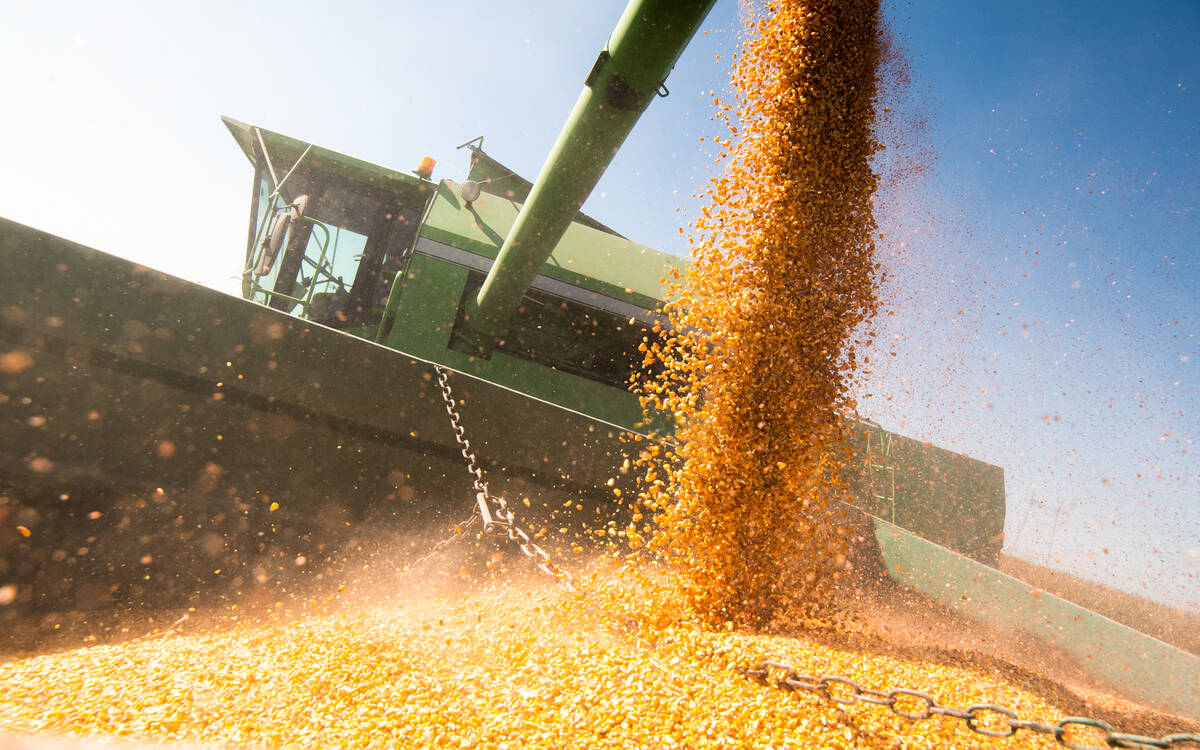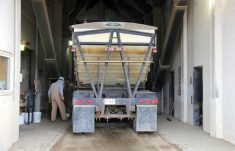Canadian National Railway’s fire-damaged bridge at Lytton, B.C. reopened for traffic Tuesday — but all train movement, including for grain, through British Columbia’s wildfire-ravaged southern Interior, is “hit and miss” and will remain so until the fire risk lessens.
“Both (CN and Canadian Pacific Railway) are having troubles because there are so many fires in the area,” Mark Hemmes, president of Quorum Corp. and Canada’s grain monitor, said in an interview Thursday.
“There was a new fire around Lytton (Wednesday). Fires had started around Cache Creek and Ashcroft. It’s just a mess down there. I think (CN) ran a train Tuesday night and then they had to stop and didn’t run a train until yesterday morning.
Read Also

Feed Grain Weekly: Corn affecting barley prices in Lethbridge
Corn imports entering Lethbridge have lowered prices for feed barley compared to those in Edmonton.
“With forest fires all over the place you don’t want to run trains at night and all of a sudden a wildfire hits and it catches a train in the middle of nowhere. That crew is in danger.”
Even after nearby fires are controlled, train movement will be delayed because whenever weather conditions raise the fire threat, under a new order limiting train speeds in extreme fire risk areas, issued by federal Transport Minister Omar Alghabra effective Saturday.
Why it matters: All train traffic, including grain, destined for the Port of Vancouver, travels through southern B.C. Measures to slow trains, to reduce the risk of starting wildfires, will slow grain movement.
The July 1 wildfire that destroyed 90 per cent of Lytton killing two residents, also damaged CN’s bridge by the town.
There were unconfirmed reports the fire might have been caused by sparks from a train. An investigation continues.
Because of a track-sharing agreement the bridge’s closing also affected CP track.
To improve efficiency all trains heading west from Kamloops to Mission, B.C, switch to the CN line. Trains going east from Mission use CP’s line back to Kamloops.
While CN’s bridge was out, some CN trains moved east on CP’s line, creating a backlog for both railways, Hemmes said.
CP resumed operations July 5, CP spokesman Andy Cummins wrote in an email.
“On July 9, train traffic in the corridor ceased for 48 hours in compliance with a (previous) Transport Canada order,” he wrote. “CP resumed operations again on July 11 and is reducing the traffic backlog.”
Meanwhile, CN is following safety protocols to prevent fires, CN spokesman Mathieu Gaudreault wrote via email.
“Moreover, we are increasing patrols that precede and follow trains,” he wrote. “These patrols are equipped with fire suppression equipment and keep a constant lookout for any signs of fire risk.”
The Western Grain Elevator Association (WGEA), which represents Canada’s major grain companies, is watching the results closely.
“If there is such a thing as a silver lining in this case it is we are in a slower (grain) shipping period relatively speaking,” WGEA executive director Wade Sobkowich said in an interview. “It would be much more impactful if this was to happen in October, for example.
“That being said for the grain still needing to move, the impact of the Lytton fires is that exporters are not able to load and execute in a timely fashion. The perception might be there’s not a lot of grain left… so it’s not having as big an impact, but… it is impacting that grain that wants to move and is destined for vessels to execute on a sale to a customer.”
As for how Alghabra’s order affects grain movement, Sobkowich said it depends on the weather.
“It depends on how many days we have over 30 C (when trains, under the order, must reduce speeds),” he said. “And it depends on other traffic. It depends on so many variables. That order puts operational restrictions on those lines when the (fire) hazard rating is listed as extreme. So when will that be between now and the end of October?”
Western Canadian grain shipments to Vancouver had been running at record pace much of the crop year, but were slowing in recent weeks as is usually the case just ahead of harvest.
But the Lytton bridge closure slowed grain movement even more, Hemmes said.
“The stocks are really starting to deplete,” he said in an interview Monday, the day before the Lytton bridge re-opened. “When we look at some of the daily reports on unloads in Vancouver you get zeros across the board.
“There’s not a lot of grain that’s making it across and into the lower mainland and that’s going to become a little bit problematic with vessels continuing to arrive… but you really can’t hold the railways responsible for that. They are as much a victim of the circumstances as anyone else.
“It’s not a catastrophe because we are in a period of time (of lower movement). If this would’ve happened in the fall it would of just reverberated through the whole rest of the crop year.”
In the short term, coal and potash shippers will probably be hurt more than grain, Hemmes said.
“Certainly the container business will be hurt,” he added. “You keep getting container ships showing up and unloading on the docks (in Vancouver), but pretty soon the docks get full so you can’t unload anything more.”
These events underscore how reliant Canada’s grain farmers are on just two rail lines running through B.C.
“It’s a narrow track across the prairie and if any piece of it is disrupted it affects the whole thing,” Sobkowich said. “It really defines the saying ‘we are only as strong as our weakest link.'”
While it’s critical for grain companies to get grain to Vancouver to meet current sales, the peak time for grain movement usually starts in late September.
“But regardless of the size of the crop we are going to see here (in fall) grain companies are going to want to buy and sell as much as possible in the earlier part of the (crop) year,” Sobkowich said.
“The size of the harvest, I wouldn’t link that to the fires or disruption in the pipeline because once that harvest comes off grain companies will want to move as much as possible as early as possible.”
— Allan Dawson reports for the Manitoba Co-operator from Miami, Man.
















